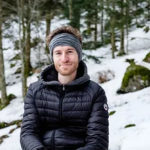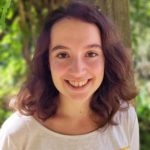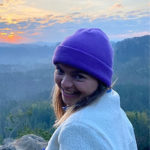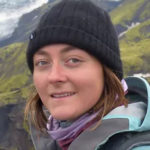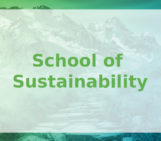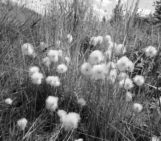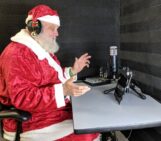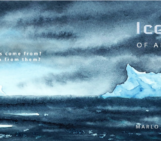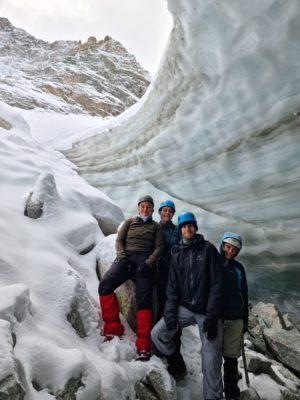
In high-school, I learned in a textbook that glaciers are melting. My teacher said that what was written in that textbook was right, and that was it. There was no proof, no explanation, no scientist’s testimony. All of that, I discovered much later during my studies in the geosciences. Yet as the global temperatures keep rising, and our politicians apply rigorously the “keep calm and carry on” model, it is highly necessary to trigger attitude change and concrete actions as early as possible. This is exactly why we created our project, CordillerICE.
About the project
CordillerICE is a student-led project and is made of a team of four aspiring French scientists who wish to share their knowledge with a wider audience than among themselves and with a handful of colleagues. To achieve this goal, our team will travel throughout South America for seven months and work with the local scientists in glaciology and earth science research groups each step along the way, both to contribute to their research projects and to learn from them. We will be travelling along the Andes Cordillera, starting from Patagonia moving all the way up to Peru, and we plan to visit UMAG in Punta Arenas, CIEP in Coyhaique, IANIGLA in Mendoza, UNSAM in La Paz and INAIGEM in Huaraz. We hope that our contributions can include fieldwork assistance, instrument testing, and collaborative measurements with the local research groups.
We plan to conduct interviews with the scientists we meet along the way to communicate their experiences and research results of climate change to the public, and in particular their observations of the changing Andean glaciers. We hope that upon our return from this expedition, we can produce a documentary on the Andean glaciers, how their melting is tightly linked to global warming and the impact all this has on human activities.
Motivating young minds
We do not want to keep this amazing experience for ourselves. Throughout the project, we will be in constant exchange with classes of primary, middle, and high schools in France. Before our departure, we will meet each class in person, so they get to know us and understand the aims of the project. After that, and during our entire journey, we will exchange with them weekly about glaciers, climate change, as well as our cultural discovery in South America through blog posts on our website. Our goal is to show them why science is more than just textbooks and facts set in stone, and how their own discoveries can contribute to the understanding of our planet. We hope that showing them visible consequences of climate change will encourage young students to commit individually and inspire them to choose environment-oriented careers. They will also discover through our journey what the life of a scientist is like, which we hope will light the spark of science and lead some of them to follow science studies, especially young women who might feel at odds in currently male-dominated STEM fields.
How it all started
Our project started as the idea of a one-woman-backpacking-expedition. We dreamt of vacations half a planet away from the stress of work. However, the discussion with the student team of the “A l’ombre des glaciers alpins” project sowed the seeds of something far more interesting: it gave this journey a meaning far beyond our personal ones. The Andes Cordillera in South America is a good candidate as it stretches along the whole continent and has a great glacier diversity to be studied. From there, everything quickly snowballed: we built a team, found teachers bold enough to trust us, contacted scientists in many research institutes to collaborate with… Now, after months of work and planning, we are only a few weeks away from the departure!
Our expedition will begin in January 2023: we will start in Punta Arenas and slowly travel our way up the Andes. Feel free to visit our website to learn more about the team and our project, or simply follow us on Instagram for more light-hearted content!
Edited by Loeka Jongejans and Marie Cavitte
Gaston Bidou has just graduated from his engineering degree in Ecole Polytechnique. He studied computational fluid dynamics and geosciences over the last 4 years. Contact Email: gaston.bidou@mines-paristech.fr
Domitille Dufour is taking a gap year within her Master of Science in ENS Ulm. She studies geosciences. Contact Email: domitille.dufour@ens.psl.eu
Emma Denise is taking a gap year within her Master of Science in AgroParisTech. She studies forest environments. Contact Email: emma.denise@agroparistech.fr
Maud Bernat has just graduated from her engineering degree in Ecole des Mines de Paris and her Master of Science in ENS Ulm. She studied geosciences with a specialization in glaciology. Contact Email: maud.bernat@mines-paristech.fr


